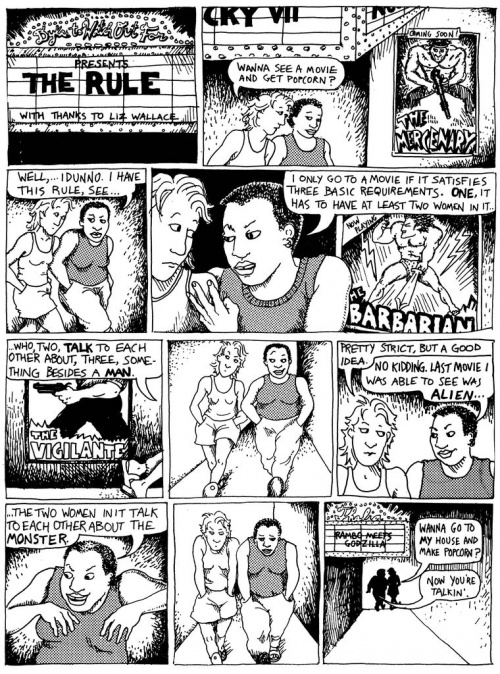Bechdel Test: Difference between revisions
mNo edit summary |
|||
| Line 6: | Line 6: | ||
The test was popularized by '''Alison Bechdel''''s comic '''Dykes to Watch Out For''', in a 1985 strip called <u>''The Rule''</u>: | The test was popularized by '''Alison Bechdel''''s comic '''Dykes to Watch Out For''', in a 1985 strip called <u>''The Rule''</u>: | ||
[[File:The_Bechdel_Test.jpg|500px|center]] | |||
Two further two points should be noted: | Two further two points should be noted: | ||
Revision as of 03:20, 11 March 2012
The Bechdel Test, sometimes called the Mo Movie Measure or Bechdel Rule is a simple test for film and other media which names the following three criteria:
- It has to have at least two [named] women in it
- Who talk to each other
- About something besides a man.
The test was popularized by Alison Bechdel's comic Dykes to Watch Out For, in a 1985 strip called The Rule:
Two further two points should be noted:
- Passing or failing the test has no bearing at all on whether a film (or other media) is good.
- Passing the test does not necessarily make it more feminist, or otherwise, positive-for-women.
So what is it, then? A crude tool to start thinking about sexism in cinema. One film failing is not a problem. When all the films you know bar one or two fail, it suggests a bigger picture where, broadly, women have nothing to do. They’re either absent, or exist purely to support male protagonists. It implies their underdevelopment – they don’t have personalities, interests or roles in the plot outside of said male protagonists. - The Bechdel Test: What It Is, And Why It Matters
For more information about the Bechdel Test, see:
- Bechdel Test Movie List
- Wikipedia: The Bechdel Test
- TV Tropes Wiki: Bechdels Rule
- The Bechdel Test: What It Is, And Why It Matters
Even though Young Hercules is a show that primarily focuses on three male leads with few female characters, it still manages to pass the test every so often. Episodes that pass the Bechdel Test:
1.09 Amazon Grace
- Lilith and Cyane talk about why Lilith is at the academy and fitting in while throwing javelins.
- Lilith, Cyane, and Simula are seen talking as the camera pans around the bonfire - presumably they are talking about life as an Amazon or some other non-man related topic.
- At the end of the episode, Lilith asks to join Cyane's tribe.
Cyane: Sure. So... why do you train with boys?
Lilith: Well, I wanted to be a warrior. There was no academy for women, so I came here. It’s the best. I’m just having a little trouble fitting in.
Lilith: Hey, I would love to join in that journey... if you’ll have me.
Cyane: Well, of course you’re welcome.
1.22 A Lady in Hades
- Eurydice and Cynthea talk about the fate of Cynthea's daughter, Sarah. Although the conversation briefly does touch on a man (Bacchus), it quickly goes back to comparing Sarah's fate to Eurydice's.
Eurydice: I'm sorry. None of us meant to help Bacchus hurt people. I was like Sarah. I thought Bacchus was an answer to all my problems.
Cynthea: If you were like Sarah, then why are you still here?! Why were you spared?!
Eurydice: I haven't been spared. I'm so sorry for the pain I've caused you. I don't know how to fix it.
Cynthea: You can't!
1.25 Herc's Nemesis
- Nemesis and Hera briefly speak about Nemesis's talents before the conversation goes to her father.
- Hera and Stregna talk about Nemesis.
Nemesis: I have no choice but to fulfill my obligation.
Stregna: I will not let you down, Hera.
Hera: Dip this arrow in the bowl of Hind's blood - the only thing that can kill a god. Careful - a scratch and you will be lost. Nemesis is clever. You will only have one chance.
1.29 Sisters
1.30 The Golden Bow
1.31 Home for the Holidays
1.35 My Fair Lilith
1.38 Me, Myself, and Eye
- The Fates?
